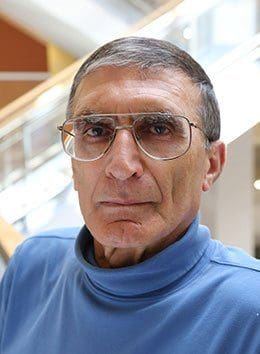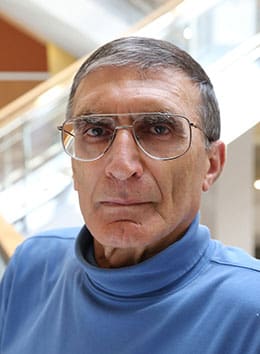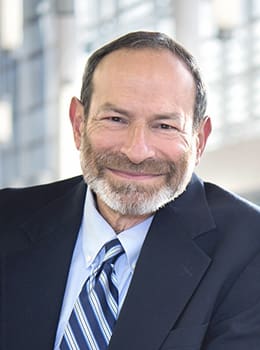
The UNC Board of Governors has conferred the O. Max Gardner Award, its highest faculty honor, on two distinguished professors, one from the University of North Carolina at Chapel Hill and and the other from Western Carolina University. Recent Nobel Prize winner Dr. Aziz Sancar, the Sarah Graham Kenan Professor of Biochemistry and Biophysics at the UNC- Chapel Hill School of Medicine, and David A. Shapiro, the Robert Lee Madison Distinguished Professor of Communication Sciences and Disorders at WCU, are the 2016 recipients of the award.
The award, established by the will of North Carolina Governor O. Max Gardner, recognizes faculty who have “made the greatest contribution to the welfare of the human race.” It carries a $20,000 cash prize and is the only award for which all faculty members across the 17 campuses are eligible.
The award was presented to Shapiro today (May 27) during the Board’s regular May meeting by UNC President Margaret Spellings and Board of Governors Chairman Lou Bissette. Sancar is out of the country and will be recognized at the Board’s July meeting.
Aziz Sancar
Winning the Gardner Award is the latest in a long line of international achievements for Sancar, who shared the 2015 Nobel Prize for Chemistry for his groundbreaking work on how DNA repairs itself.
Born in 1946 in Savur-Mardin, Turkey, Sancar was the seventh of eight children born of illiterate parents who stressed education. Sancar took well to school and to soccer, playing goalkeeper in high school and earning an invitation to try out for Turkey’s under-18 national soccer team, a dream he held since he was a small child. In the end, he was too short to pursue soccer on the national level and decided instead to focus on his studies. His high marks earned him entrance into the school of his choice in Turkey, and he chose Istanbul Medical School. He graduated in 1969 and practiced medicine near his hometown for two years.
Sancar then earned a NATO fellowship to study at Johns Hopkins, where Stan Rupert had discovered DNA repair in 1958. By the time Sancar met him, Rupert had moved to the University of Texas at Dallas, where he was trying to purify the repair enzyme photolyase, but he was unable to because the enzyme is not abundant. Sancar joined Rupert as a graduate student in 1974 and worked to increase the amount of the enzyme by cloning the gene that encodes for it. Sancar cloned the gene in 1975, making him the first scientist east of the Rocky Mountains to clone a gene. For this work, Sancar earned his PhD in 1977 and moved on as a postdoc to Yale University, where he invented the maxicell method of identifying proteins and figured out the mechanism of another DNA enzyme system called nucleotide excision repair. Sancar cloned the genes responsible for this kind of DNA repair in bacteria and purified the proteins encoded by these genes. These proteins, acting together, cut out a 41-nanometer stretch of the double helix strand to remove damaged DNA.
Sancar returned to his photolyase research in 1982 when he was recruited to UNC-Chapel Hill. Here, he finally purified photolyase and – in collaboration with his wife Gwen Sancar, PhD, and others – showed that the enzyme works as a blue-light-powered machine to repair ultraviolet light-induced DNA damage.
At Carolina, Sancar continued his work on bacterial light-dependent photolyase and nucleotide excision repair, and worked out the mechanisms of both systems in exquisite detail in bacteria. By the time he earned his full professorship in 1988, he had begun working on nucleotide excision repair in humans. In 1992, he discovered that human nucleotide excision repair is very different from the bacterial system; the damage is removed by cutting out an 88-nanometer stretch of one strand of the double helix in human cells. In subsequent years, he demonstrated that the human excision repair system requires 15 proteins; E. Coli bacteria require only three. He also detailed how these proteins assemble during the repair.
This mechanism repairs the damage to human skin caused by sunlight every day. It is also the mechanism that cancer cells use to defend themselves against the DNA damage caused by the common cancer drug cisplatin. This work culminated in an excision repair map of the entire human genome, which his lab published in 2015.
In addition to this work, Sancar also discovered one of the four genes that control our biological clock. While investigating whether humans have photolyase, he found that humans do have a similar gene that encodes for a similar protein, but the human protein has no repair activity. He named it cryptochrome and showed that it is a vital component of the molecular clock that sets our daily rhythm. Most recently, he discovered how the four circadian clock proteins interact throughout the 24-hour cycle and what this means for treatment paradigms of various diseases, such as cancer.
As an educator, Sancar has trained nearly 100 graduate students and postdoctoral fellows, as well as hosted many international visiting scientists to his lab. He and his wife founded the Carolina Turk Evi – Turkish House near the Chapel Hill campus through the Aziz and Gwen Sancar Foundation as a way of hosting Turkish scholars and promoting better understanding and increased ties between the U.S. and Turkey.
He has received numerous honors and awards for his achievements: Presidential Young Investigator Award, National Science Foundation, 1984; American Society for Photobiology Research Award, 1990; Associate Fellow, Third World Academy of Sciences, 1995; Scientific and Technological Research Council of Turkey, Basic Science Award, 1995; Fellow of the American Academy of Arts and Sciences, 2004; Member of the National Academy of Sciences, U.S., 2005; Member of the Turkish Academy of Sciences, 2006; Vehbi Koç Award from the Koç Foundation of Turkey, 2007; University of Texas at Dallas Distinguished Alumni Award, 2009; The Vallee Award in Biomedical Science, American Society for Biochemistry and Molecular Biolog, 2015; and The Nobel Prize in Chemistry, 2015.
David A. Shapiro
As a speech-language pathologist and board-certified specialist in fluency and fluency disorders, Shapiro has given the gift of unimpeded communication to thousands of people who stutter by helping them achieve fluency of speech. His work has taken him to six continents for both research and service delivery, and he has been honored for his efforts from state, national and international associations. As president of the International Fluency Association, he expanded the organization’s membership from the United States and United Kingdom to countries across the globe.
He launched international advocacy efforts similar to Doctors Without Borders to assist people with fluency disorders in developed and developing nations, including countries where reaction to stuttering may lead to discrimination, injury, and even death. Through his international outreach, Shapiro has positively affected the lives of people who stutter in more than 30 countries on six continents, ranging from the Czech Republic to several African nations, and from Japan to Norway.
As an educator in Western Carolina’s Department of Communications Science and Disorders, Shapiro also has taught and mentored hundreds of undergraduate and graduate students, many of whom have gone on to successful careers as clinicians and scholars using Shapiro’s techniques.
Shapiro joined the WCU faculty in 1984 and was appointed the Robert Lee Madison Distinguished Professor in 2008. He began his professional career in 1977 as a clinician in the Department of Communication Disorders in the Bristol, CT, public school system. He then worked briefly with the Department of Speech Pathology and Audiology at the University of Michigan at Ann Arbor before becoming a clinical supervisor and lecturer at the University of Connecticut-Storrs. Shapiro later served as an instructor, researcher and supervisor in the Department of Speech and Hearing Sciences at Indiana University-Bloomington before coming to WCU.
Shapiro earned his BA in psychology, speech-language pathology and audiology from the State University of New York at Albany, followed by an MS in communication disorders from the University of Vermont-Burlington. He completed his PhD in speech-language pathology from Indiana University-Bloomington.
Shapiro is the author of “Stuttering Intervention: A Collaborative Journey to Fluency Freedom,” and has written or co-authored more than 85 academic papers and articles in seven languages. He has been awarded more than $1.3 million of grant funding over his career and has given numerous lectures and presentations across the globe.
Shapiro served as president of the International Fluency Association from 2012-15 and has received many recognitions and awards for his teaching and service. Within North Carolina, he has received WCU’s University Scholar Award and Teacher of the Year Award, the UNC Board of Governors’ Award for Excellence in Teaching, and the Clinical Achievement Award from the NC Speech, Hearing and Language Association. Nationally, Shapiro served as president of the Council of Supervisors in Speech-Language Pathology and Audiology. He also received a research fellowship from the Japan Society for the Promotion of Science and was honored with the Award of Distinction for Outstanding Clinician from the International Fluency Association.

